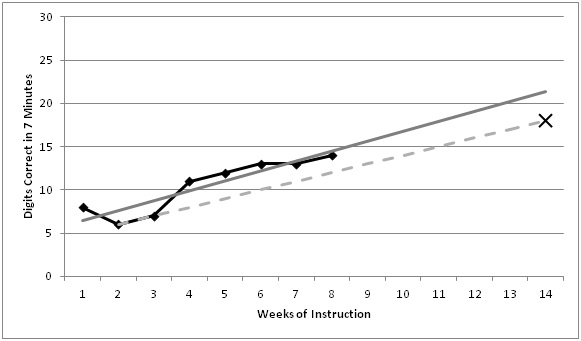Curriculum-based Measurements (CBM)
Children that show difficulties in their development are identified via a progress monitoring – the core method of the RTI approach. Curriculum-based measurements help to assess the learning progress of each student on a regular basis. Within a given timeframe of usually just a few minutes, they have to work on a test for a chosen competence area and solve as many exercises as possible. These measurements are conducted frequently (monthly or weekly) in parallel tests. Not only does this ensure a regular documentation of the learning progress but it also serves as a feedback whether a student responds to the interventions and has achieved the expected learning goals. If a student doesn’t show adequate results, it indicates that further interventions or a modification of the teaching methods should be initiated within a short time. The results of subsequent CBM's show, if the student responses positively to the additional interventions. This procedure is particularly significant in the beginning of a child’s education as permanent school problems can often be traced back to primary school lessons or even to the time at nursery school.
Eventually, the continuous learning progress is visualized in specific graphs that enable teachers, parents but also the students themselves to get a comprehensive insight into their learning development.
You can get more detailed information about curriculum-based measurements →here.
References
Deno, S. L. (1985). Curriculum-based measurement: The emerging alternative. Exceptional Children, 52, 219–232.
Deno, S. L. (2003a). Developments in curriculum-based measurement. The Journal of Special Education 37, 184–192.
Deno, S. L. (2003b). Curriculum-based measures. Development andperspectives. Assessment for Effective Intervention 28 (3–4), 3–12.
Helmke, A. & Weinert, F. E. (1997). Bedingungsfaktoren schulischer Leistungen. In: Weinert, F.E. (Ed.): Psychologie des Unterrichts und der Schule. Enzyklopädie der Psychologie. Serie I Pädagogische Psychologie 3 (71–176). Göttingen: Hogrefe.
Krajewski, K. (2003). Vorhersage von Rechenschwäche in der Grundschule. Hamburg: Kovac.
National Center on Response to Intervention (2010). Essential Components of RTI – A Closer Look at Response to Intervention. Washington, DC. Zugriff am 13.03.2014. Available online at <https://www.rti4success.org/resource/essential-components-rti-closer-look-response-intervention> 13 March 2014.

